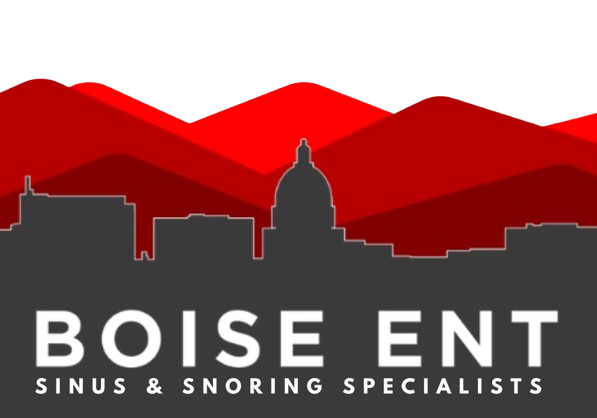Should You See an ENT for Snoring?
You might ask yourself if you should see an ENT for snoring treatment. We understand the challenges that individuals face when dealing with snoring-related issues. If you find yourself among the many adults who snore and wake up feeling unrefreshed, exploring alternatives to CPAP machines or mouth appliances may be right for you. Consulting with an ENT specialist can provide personalized insights and a tailored treatment plan to address your specific concerns, ultimately contributing to a more restful and rejuvenating sleep experience.
On This Page: What causes snoring? | Snoring Treatments | Snoring FAQ | Contact Us
What Causes Snoring?
First and foremost, gaining insight into the root cause of your snoring is crucial. Numerous factors can influence your breathing patterns during sleep, including:
- Obstructive Sleep Apnea (OSA)
- Chronic nasal congestion
- Obesity
- Anatomical variations in the nose and throat (such as enlarged tonsils or deviated septum)
- Alcohol consumption, especially before bedtime
- Hypothyroidism
- Smoking
- Age-related changes in the throat and tongue muscles
- Sleep position, especially on the back
Most Effective Treatments for Snoring
Treatment approaches may vary based on the identified factors contributing to your snoring. For cases related to nasal congestion, interventions like nasal decongestants, corticosteroid sprays, or corrective surgery might be considered to improve airflow. Throat-related issues could be addressed through lifestyle modifications, positional therapy, or, in some cases, surgical interventions.
Once the underlying cause of your disruptive snoring has been identified, you can explore a range of options, spanning from non-surgical interventions to surgical treatments.
Non-Surgical Treatments for Snoring:
- Lifestyle changes (weight loss, reducing alcohol intake, quitting smoking)
- Sleeping on your side instead of your back
- Over-the-counter products like nasal strips or external nasal dilators for nasal congestion
- CPAP (Continuous Positive Airway Pressure) machine for sleep apnea
- Oral appliances designed to keep the throat open
Addressing underlying conditions (allergies, hypothyroidism, etc.). Your doctor may prescribe you allergy medications for a period of time. If they do not work after a predetermined time, they may consider other options.
Surgical Treatments for Snoring:
- Uvulopalatopharyngoplasty
- Thermal Ablation Palatoplasty
- Tonsillectomy
- Adenoidectomy
- Maxillo-mandibular advancement
Snoring FAQ
Is snoring a sign of a more serious health condition?
Yes, snoring can be a sign of a more serious health condition. While occasional snoring is common and might not indicate a severe problem, frequent and loud snoring can be a symptom of underlying health issues such as:
1. Sleep Apnea: A serious sleep disorder where breathing repeatedly stops and starts during sleep. Obstructive Sleep Apnea (OSA) is the most common type, where the throat muscles intermittently relax and block the airway during sleep.
2. Obesity: Excess body weight can lead to fat deposits around the neck area, causing airway obstruction during sleep.
3. Chronic Nasal Congestion: Difficulty breathing through the nose due to chronic nasal congestion can lead to snoring.
How do I know if I need a sleep study?
The symptoms that could prompt your doctor to suggest a sleep study encompass a range of indicators, including:
- Chronic Fatigue. Consistent and overwhelming tiredness, even after what should be a sufficient night’s sleep.
- Issues with Memory Recall. Difficulty remembering and recalling information, which may affect daily functioning and cognitive abilities.
- Problems Focusing. Challenges in maintaining concentration and staying alert during waking hours.
- Pauses in Breathing. Observable interruptions in breathing during sleep, often noticed by a sleep partner.
- Loud Snoring. Intense and disruptive snoring that may be indicative of underlying sleep-related issues.
- Restless Sleep. Frequent tossing and turning, experiencing a lack of tranquility during the night.
Morning Headaches: Waking up with persistent headaches, potentially signaling sleep disruptions impacting overall well-being.
How does weight affect snoring and sleep apnea?
Your weight may impact your airways during sleep. Some of the factors include:
- Neck circumference. A larger neck may result in narrower airways, making it more likely for airflow to be obstructed during sleep.
- Weakening of the throat muscles. Excess weight can contribute to the weakening of throat muscles. Weak muscles are more prone to collapse or vibrate during sleep, creating the sound of snoring.
- Increased Pressure on Lungs. Excessive weight can place additional pressure on the lungs and diaphragm, making it harder for the respiratory system to function efficiently during sleep.
What are the risks of untreated snoring?
If you leave your snoring untreated, you may experience issues with:
- Sleep Disruption. Snoring often results in disturbed sleep for both the individual snoring and their sleep partner. This can lead to daytime fatigue, irritability, and difficulties concentrating.
- Strain on Relationships. Persistent loud snoring may strain relationships, especially if it disrupts the sleep of a partner. This can contribute to tension and conflicts within the household.
- Sleep Apnea. Snoring can be a sign of obstructive sleep apnea, a serious sleep disorder. If left untreated, sleep apnea is associated with an increased risk of cardiovascular problems, high blood pressure, and other health issues.
- Daytime Sleepiness. Chronic snoring may result in excessive daytime sleepiness, affecting productivity, performance at work or school, and overall quality of life.
- Decreased Cognitive Function. Poor sleep quality due to snoring can impact cognitive function, memory, and decision-making skills.
- Cardiovascular Risks. Untreated sleep apnea, often associated with snoring, is linked to an increased risk of cardiovascular diseases such as heart attack and stroke.
Compromised Immune Function. Inadequate sleep, driven by ongoing snoring issues, may weaken the immune system, making the individual more susceptible to illnesses.
Contact Boise ENT Sinus & Snoring Specialists Snoring Specialists to Stop Snoring
 If you or your loved one is struggling with persistent snoring, affecting the quality of your sleep and your daily life, our snoring specialists are here to help. At Boise ENT Sinus & Snoring Specialists, we understand the impact snoring can have on your well-being and are committed to providing you with a personalized plan to stop snoring. Contact us today for more information.
If you or your loved one is struggling with persistent snoring, affecting the quality of your sleep and your daily life, our snoring specialists are here to help. At Boise ENT Sinus & Snoring Specialists, we understand the impact snoring can have on your well-being and are committed to providing you with a personalized plan to stop snoring. Contact us today for more information.
Boise ENT Sinus & Snoring Specialists is a proud member of the American Academy of Sleep Medicine, our commitment to excellence ensures that we provide cutting-edge solutions for optimal sleep health.
And if you are looking for a Nampa snoring specialist or Meridian snoring specialist we are proud to offer ENT services to residents of those neighboring communities as well.
Boise Snoring Specialist Reviews
I’ve had issues for years breathing and snoring, Dr Beasley was great and listened to all my symptoms and after he suggested we could try surgery. Surgery went great and after about a month I feel great and breathe wonderful(didnt know what I was missing). Also my snoring has decreased by about 80%-90%. Dr Beasley and his staff were great to work with and I would recommend him to anyone with ENT issues. – ⭐⭐⭐⭐⭐ Nash
I had a deviated septum, and decided to finally get it fixed. I asked around, Dr. Beasley was recommended so I made a an appointment with him. He is awesome. He was very personable, and walked me through the process. My wife is a P.A. Student, and when he found out, he had her come look at my septum and explained what she was looking at. His office handled all the insurance requirements (pre-approvals and the such), so all I had to do was show up.
The surgery was a success, not only can I breathe better, but I can also taste and smell better too! And of course, my wife sleeps much better since the snoring has stopped! Thanks for saving my marriage Dr. Beasley! ;) – ⭐⭐⭐⭐⭐Chris Stoddard
